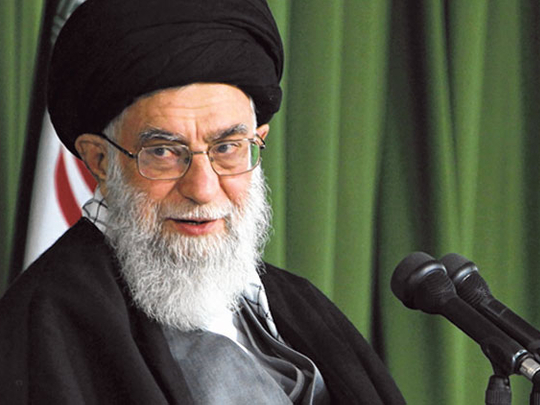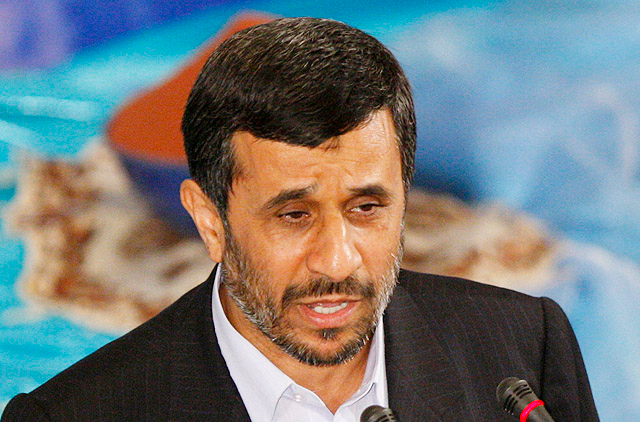
Dubai: Any military confrontation over Iran's controversial nuclear programme could be preceded by something else that has been slowly seething in the internal caldron of Iran: a popular anger from the rapidly deteriorating harsh economic situation.
There is spiralling inflation; unemployment is rising and the international economic sanctions, which were intensified in the past few months on Iran to force Tehran to back down from its nuclear plans, have already started to impact the daily life of ordinary Iranians.
Some political experts are even wondering how soon the socio-economic explosion will happen.
They expect conditions to worsen at the beginning of July, when the latest European embargo will go into effect, forcing Tehran to find alternative markets in Asia under growing international efforts to isolate Iran. While the international community fears the Iranian nuclear programme has a military aim, Tehran insists it is for civilian purposes.
The economic sanctions also aim to weaken Iran to a point where there would be a change in the political system, Mahjoub Zweiri an expert in Iranian affairs and a political science professor at Qatar University said in an interview with Gulf News.
"It became clear for the Americans and the Europeans that this strategy is less costly. In other wards, you punch your enemy with the knockout [blow] with the least possible cost," Zweiri added.
Citing the imposition of sanctions on Libya and Syria, Zweiri said, "it proved that strict economic sanctions will lead to public annoyance. That, coupled with feelings of displeasure because of the political oppression, will [make people] push for change."
Support for leaders
Leaders of Iran, which has been under international sanctions for nearly 33 years after the Islamic revolution, has used the economic sanctions as a reason to gain support for their cause in the face of external pressures, analysts say.
Focusing on the western "conspiracies" against Iran amid deteriorating economic conditions is more of a strategy adopted by Iran's leaders, said Alireza Nader, a senior analyst at RAND, a Washington-based think tank.
The strategy of diverting the attention of the public from the internal issues by highlighting the confrontation between Iran and the West "may help unify the political class, to some extent," Nader told Gulf News.
"Now, it is not clear if the strategy is really working, that the population is really distracted because Iran faces so many internal problems and the Iranian government's attempt to distract the population is [not] necessarily going to work given the magnitude of the issues Iran faces," he added.
Inflation in the oil-rich country is around 21 per cent, according to official figures. Unofficially it is in the thirties. Unemployment in the country of 74 million is around 15 per cent. Unofficially, it is double that figure. Yet, most Iranians are against foreign intervention.
Accordingly, any military strike against Iran, will make "a lot of the Iranians, not all of them, basically back the Iranian government, even if they don't like the regime," said Nader.
Such anticipated attitude is providing "some space" for the conservative government of Ahmadinejad to crack down on its opponents, analysts said.
Iran's government had crushed the "green movement" of 2009 that protested the results of presidential elections and the re-election of Ahmadinejad against two prominent reformist candidates Mir Hussain Mousavi and Mahdi Karroubi.
While the reformist camp accused the authorities of fraud in the elections, the government denied the charge and accused the reformists of implementing a western plan to destabilise the religious institution.
"The security grip has increased 500 per cent since 2009" in Iran, said Zweiri.
"Practically, the reformists don't exist on the political arena. Their leaderships were either politically isolated, or [now] under house arrest," Zweiri added. Many reformists were sent to prison.
Reformists
The authorities have allowed some reformists to run in the upcoming parliamentary elections on March 2, but they are closer to the conservative camp rather than the liberal reformists' camp, according to political experts.
A low turn out in the upcoming elections will surely "show that the legitimacy of the regime has shaken. And this will be the first time in 33 years," said Zweiri.
Iran's supreme leader Ayatollah Ali Khameini "didn't hesitate last week during a public meeting to say that the government should do everything it can to guarantee the highest possible turnout. This comes as an order to the government," Zweiri said.
Low turn out will keep all "possibilities on the table", including a pre-emptive military action by Iran to "mix the cards," noted one analyst. While the economic issues are getting worse, "the main challenge facing the Iranian regime is not necessarily the US or Israel," he added.
"The main challenge is the Iranian people."












